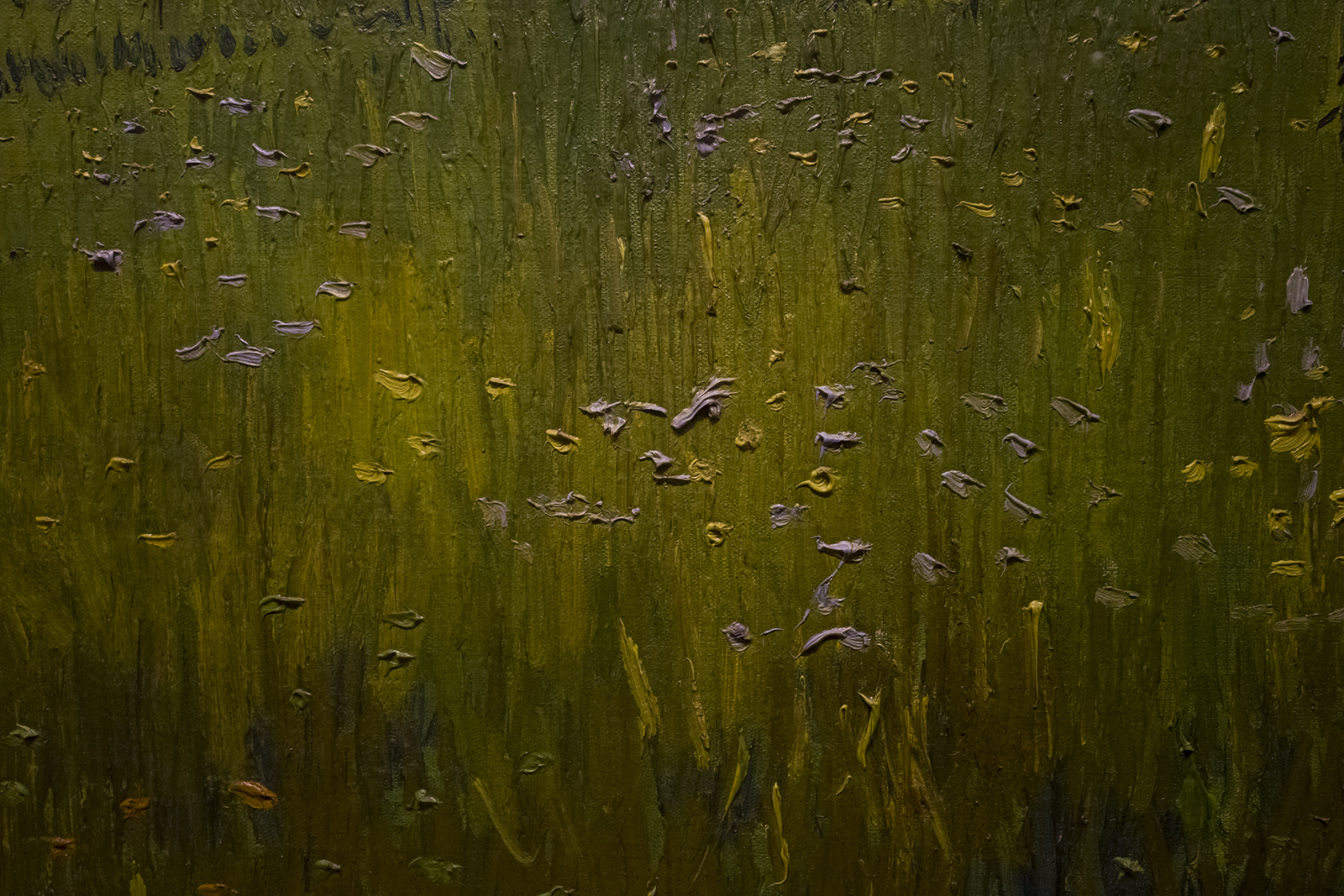
Vincent Van Gogh, The Poet’s Garden (detail), photograph by Jason Francisco
Today at the University of San Francisco (USF), in the Archbishop Romero room of the University Ministry Offices, I participated in a vigil to share our grief at the terrible violence and inhumanity that has come to Israel/Palestine, and to mourn and say Kaddish for those who have died thus far. Here are the personal reflections I shared:
I am moved and grateful to be here today with each of you. I’m grateful to be part of a Jesuit university and interfaith community that uplifts human dignity and the sacred value of all life. Our USF community can and must be sustained by these Jesuit and human values that enable us to engage in dialogue with mutual respect and fellowship. We can learn from each other and we can become more sensitive and deeper as a result.
We are Catholics and Protestants, Muslims, Hindus, Buddhists and Jews, believers and nonbelievers. Israel/Palestine is far away from us geographically, but today it is very close emotionally. Israel/Palestine is right here, on our campus, in this room, in our hearts. We feel traumatized by the extreme horror and suffering of recent days, and grave concern. Many of us have family and friends there. We are grieving and mourning, and we feel fear and dread for what will come.
Martin Luther King, Jr. asked us to imagine that humanity is a family that has inherited a house. He called this the World House. Humanity’s most urgent challenge, he said, is to find a way to share this house together in peace.
Dr. King carried forward a living vision of the Beloved Community. Not the Kingdom of God on earth in a messianic era. We cannot wait for the lion to lay down with the lamb. We have to make our world a Beloved Community now.
Here at USF we work hard to make our university a small Beloved Community, a small example of what a global Beloved Community can become.
What does that require of us?
It requires great care.
Cura personalis, care for each member of our community as the whole person.
Cura personalis means that we are careful. Careful in our words and actions not to hurt each other. This obligation is especially important now. Careful not to use words or to take actions that will add to the suffering pain and trauma we are experiencing.
Cura personalis requires a commitment to nonviolence, and especially interfaith nonviolence.
I recently had the great privilege to spend time with Ali Abu Awwad, the courageous founder of Taghyeer Movement for Palestinian self-determination. “Nonviolence is our identity,” Awwad affirms. “It’s the art of our humanity, and the best celebration of our existence.”
Cura personalis requires that we listen to each other, especially when we are in pain, and that we make a special effort to learn about each other’s life experiences, especially those who have a different heritage and come from a different faith tradition from our own.
In this time of agonizing crisis and heartbreaking tragedy in Israel/Palestine, our community’s need for cura personalis is intensified. At this time, I believe that those of us who are Jews have a special obligation to listen, with great attentiveness and care, to our Muslim brothers and sisters who understand the struggle for sovereignty, democracy, security and human rights in Israel/Palestine through the lens of Palestinian history and trauma, displacement, the Nakba, and the struggle for national liberation. And I believe that those of us who are Muslim and Christian have a special obligation in this painful time to listen, with great attentiveness and care, to the Jewish members of our community who understand the struggle for national sovereignty, democracy, security and human rights in Israel/Palestine through the lens of Jewish history and trauma, in which the celebration of Simchat Torah last Saturday was the occasion of the most horrific mass murder of Jews since the Nazi Holocaust.
It is very difficult to listen to each other and affirm each other in a time of such extreme communal violence. It is painful to take in the other’s truth. It takes courage.
But we can recognize the narrative, and the suffering, of the other without diminishing our own humanity, or the communal identity we hold dear. On the contrary, our humanity is diminished when we refuse or we are unable to recognize and affirm the humanity of the other.
Cura personalis requires that we defend and uphold the priceless value of every human life.
The following days and weeks will be extraordinarily painful. To get through these dark times without inflicting further harm, we must hold up our commitment to care for each other, protect each other, and defend each other’s humanity, no matter what.
Jonathan D. Greenberg, October 11, 2023
